#mostly podcasts
Text
As someone who’s not a fan of horror I certainly do consume a lot of horror content
#mostly podcasts#I mean I don’t consume a lot of horror but like#more than someone who doesn’t like horror does#okay but horror podcasts are so good I can’t stop even if it makes me cringe when it gets gross#rambles
2 notes
·
View notes
Text

That's how it went
#tma#the magnus archives#tma podcast#magpod#mag 160#tma spoilers#tma s4#tma season four#jonathan sims#elias bouchard#my stuff#thats all i could think of after hearing elias talk abt jon being an archive#all jokes aside it makes me so sad and crazy to think abt it#like theres a lot in tma about losing ones humanity#and jons choices surely contribute to him losing it as well#but for the most part its him being dehumanised by others#well mostly elias and his plans of creating an archive of fear#jon going from 'a person having a position (the head archivist)' -> 'a person being a position (the archivist)' and finally to 'a position#(an archive)#its just so sad#and the fact that it ties with him losing bodily autonomy and being viewed like an object instead of a person#im dead on the floor crying#okay im done sorry#tma shitpost
3K notes
·
View notes
Text

CW: HUMAN SKELETON
i was thinking about how deep a mark can go
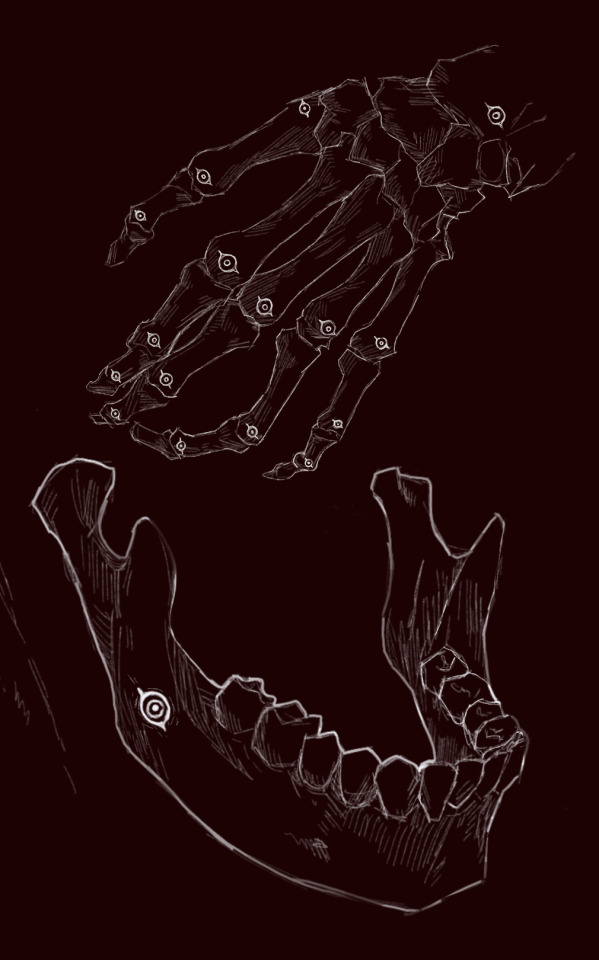
#the magnus archives fanart#tma#the magnus archives#gerard keay#gerry keay fanart#the eye#this was mostly an excuse to draw a skellington#fanart#artwork#tma podcast#the eyes are likely all in the wrong spots#skeleton
7K notes
·
View notes
Text

I found a really good refrence... So Kayne.
Oh also the og refrence under the cut cause i did use it for the background:

#malevolent#malevolent podcast#kayne#kayne malevolent#arthur lester#my art#i really like the effect of drawing charakters on photograph backrounds i should do that more aften#arkayne#i honestly like arkayne mostly as a one sided ship of kayne being like bbgirl! and Arthur being like ewww ya know its nice#kayne doesn't have blood this time of well he does have his many many teeth#also he is always rocki g an anachronistic suit and i hope you guys notice cause i always try to show that#like its much tighter and it has a diffrent shape#his inspo is also beetlejuice (the musical version) the devil and kinda will wood#also his hair is suppose to have like an angler fish bit but its kinda lost in my new design for him (also i draw that with every#male charakter i draw so oh well)
1K notes
·
View notes
Text
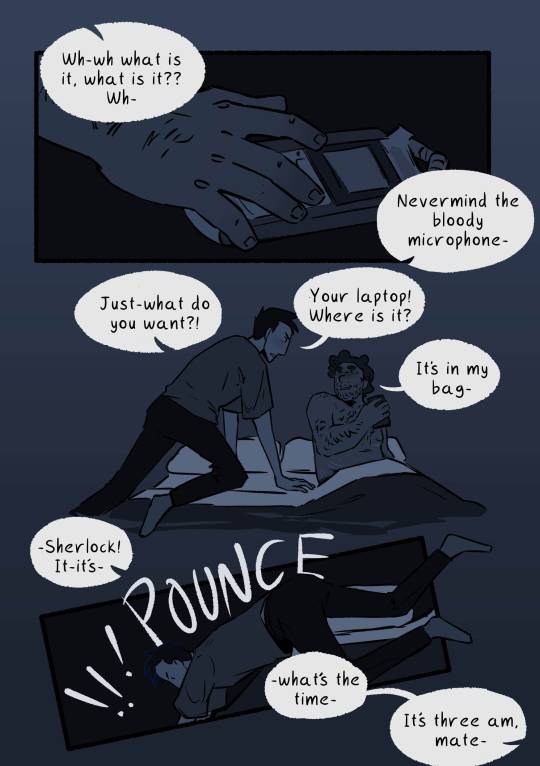
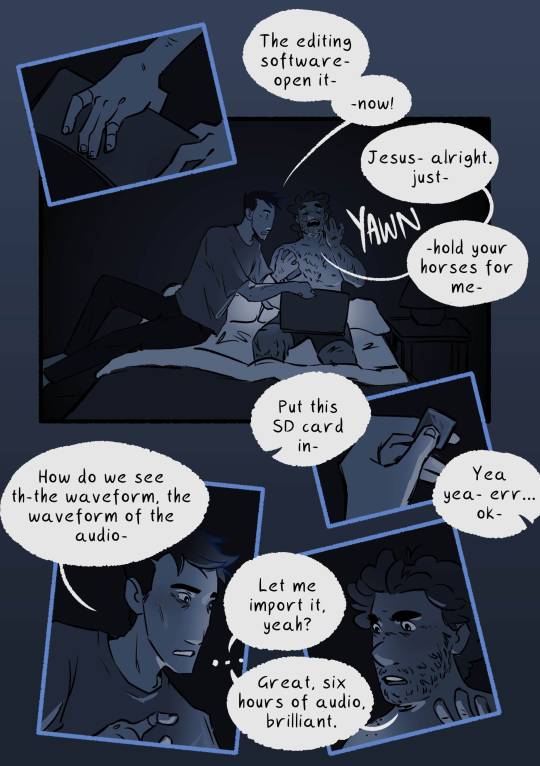
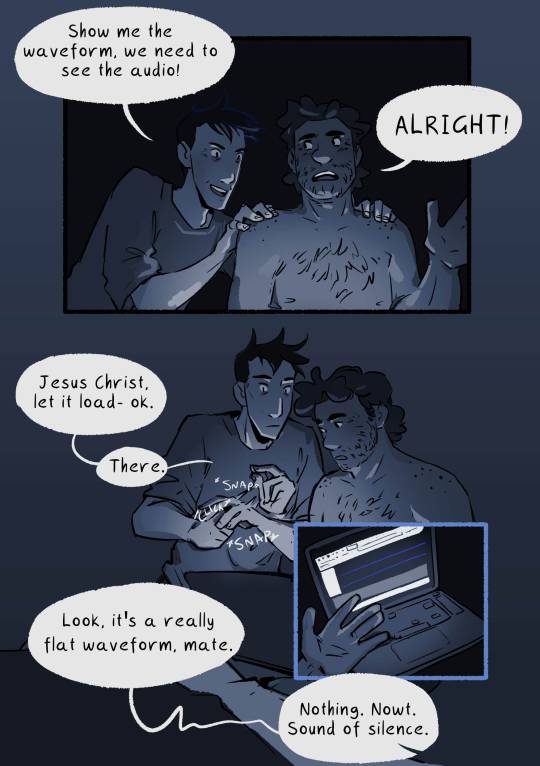
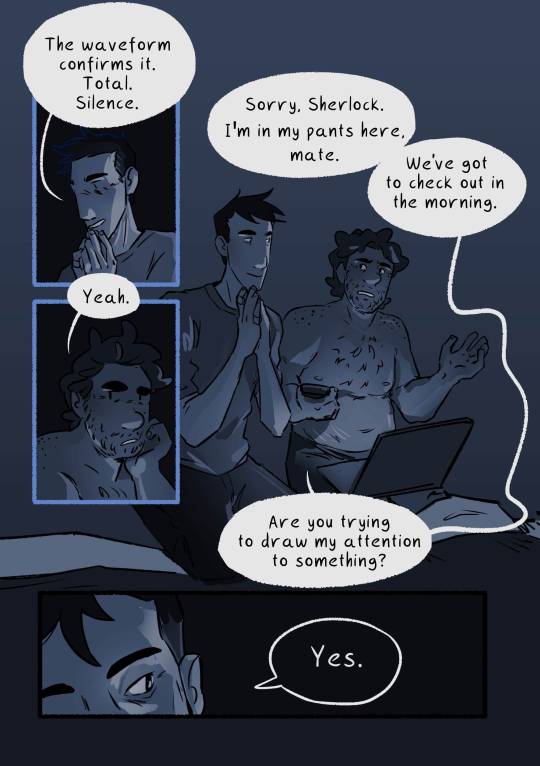
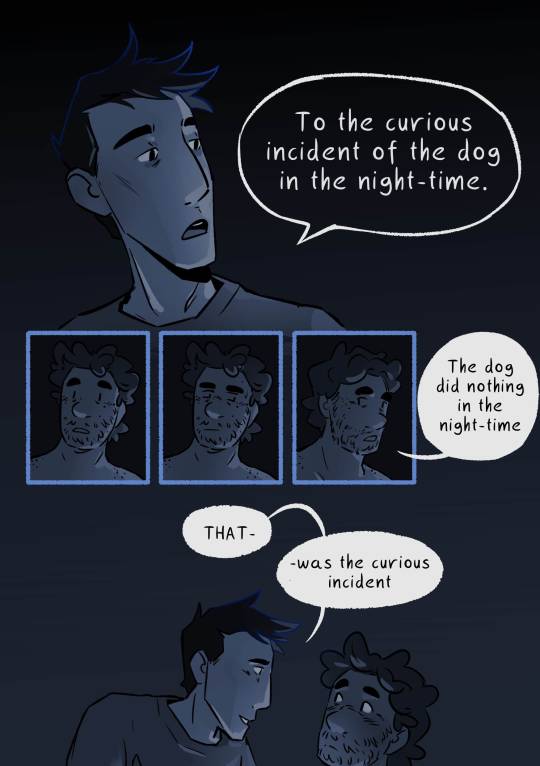
SILVER BLAZE PART THREE - happy jonkday everyone. one of these days i'll draw a scene that doesn't take place at night
#sherlock & co#sherlock and co#love when they quote acd holmes#a couple notes: i think i probably made sherlock more excitable than he actually is in this scene#its my opinion that he smiles more than we're giving him credit for but mostly i just needed to make the comic dynamic#and the thought of sherlock excitedly shaking watson was rly funny so. i did that. creative freedom#2. love that u can hear him stimming here i love him so muchhhh#3. the implication that sherlock sat and watched 6 hours. SIX HOURS of totally silent footage#and thought to himself 'hm...that was a bit quiet. TOO quiet...better wake my podcaster'#SENDS me#4. what on earth happens after this scene. does he just leave without elaborating.#anyway theyre fun to draw so thats overriding my sense that im being really annoying rn#im sooo sorry ;0;#5. yeah john has it all. freckles. stretch makes. body hair. scars. mwah#patsart
1K notes
·
View notes
Text


Another Starry Night piece but this time Welcome To Night Vale!
You all seemed to like the last one and these are fun to do so why not?
#wtnv#welcome to night vale#wtnv podcast#no_ojos_art#starry night#mostly void partially stars#thats such a good quote aswell#i think about it a lot#use this as a lockscreen or whatever
889 notes
·
View notes
Text



They are very different characters but the similarities make me laugh enough.
props to the discord for egging me on- and pointing out that Martin and Arthur would absolutely get on like a house on fire! Too polite at wrong moments and great appreciators of poetry and tea, they deserve a nice cuppa and an chin-wag!
#tma podcast#malevolent#malevolent pod#john malevolent#arthur lester#jonathan sims#martin blackwood#crossover goofin#jon and john would NOT get along#but they could be convinced to respect one another I think#eventually#maybe#I am not immune to others character designs#mostly wolfywitch's bearded Martin#my brain has latched onto bearded martin post lonely like NOTHIN
460 notes
·
View notes
Text
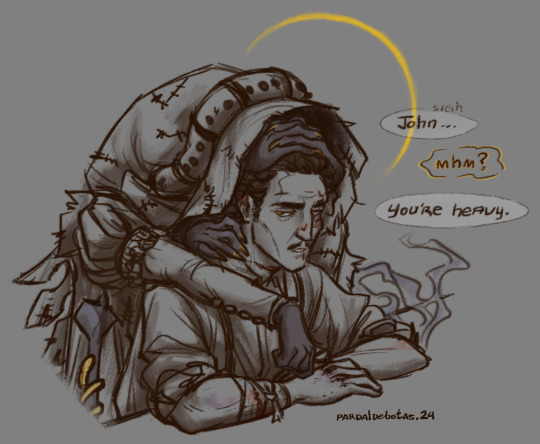
if you lack a spare coat, then the large eldritch deity bestie hitching a ride on your body will do
#is John corporeal? i dunno#don't think too hard about it lol#mostly a pose that was stuck on my head ever since i settled on face hands for John#malevolent#malevolent podcast#john doe malevolent#arthur lester#john malevolent#arthur lester malevolent#malevolent fanart#pardal does art
552 notes
·
View notes
Text
People keep talking about the whimpering horror podcast men and how distracting it can be but as a (maybe) asexual person, all I ever heard were men in pain. Other people find the whimpering weirdly erotic while I hear a guy in desperate need of a Hospital and a Therapist
#“Hahah he is whimpering so much people will think Im listening to porn”#he is in immense amounts of physical and emotional pain?????#if it wasnt clear this is mostly about Jonathan Sims and Arthur Lester since those are the 2 I know get mentioned the most#but feel free to think about anyone else#also im not hating#sexualize that man#god knows he needs a break from the torture#tag time#the magnus archives#tma#jonathan sims#tma jonathan sims#malevolent#malevolent podcast#arthur lester#malevolent arthur#podcasts#horror podcast
317 notes
·
View notes
Text

i've been thinking about a mgs star wars au so obviously this had to happen
#mgs#ocelhira#revolver ocelot#kazuhira miller#metal gear solid#star wars#id in alt text#smuggler/merc kaz and ex-jedi ocelot....#not that he was ever Really a jedi but whatever. that's not his kyber crystal.#idk what happens when ajedi get pregnant. obv the kid's gonna be force sensitive but what do u do about smth formed from a deep attachment?#i've gotta be honest most of my star wars knowledge is like half the movies andor and listening to amca mostly half asleep#which by the way. if you like star wars you should listen to a more civilized age: a clone wars podcast :)#ignore what i said about being half asleep it's really good i just cant listen to podcasts lying down and yet i continue
168 notes
·
View notes
Text
me when sherlock & co.

#sherlock and co#I'll just put it here#it doesn't need any explaining#just go listen to sherlock and co and you'll know#I'm serious it's so great#I can't stop beaming and smiling whenever I'm listening to it#and I mostly do it while in public#people must think I'm mad#I couldn't care less#sherlock#john watson#sherlock holmes#goalhanger#goalhanger podcasts#sherlock & co
1K notes
·
View notes
Text

🤔 Admittedly I was a little disappointed by the reveal (but certainly not surprised the foreshadowing was heavy in this episode lol), but not actually against how Beth (and Will) seem to be playing with it thus far- which is to say that I do think it has a lot of potential, and I suspect there's more to what we're seeing).
;) Big ol' ramble below
Mostly the theory has turned me off until now (at least insofar as I've witnessed it transpire in the fandom at large) because it struck me as so painfully ironic to see Trudy, a 1950s housewife, struggle to exist under the system that she's in, fail to fit the mold assigned to her, and be denied her personhood very literally for it (this being ironic insofar as how it mimics how she would have been treated back then). This and because frankly I just think she's a lot less interesting if she's fully a robot LOL, but I'll hopefully get to that in a bit.
Not that the hints at her mechanical nature and the relevance of Tucker's background were lost on me; I can appreciate why those would contribute to a plausible, fun and I think still mostly harmless theory (now fact). However, minus one or two specific posts I've seen on the matter (namely a recent one suggesting that if Trudy is a robot Beth is probably taking inspiration from The Stepford Wives, :( sorry person who made that post I couldn't find it I wanted to credit yoouuu), I've seen the theory just about exclusively presented in a manner that, rather than explore the metaphorical and political significance of Trudy being partially or fully mechanical, at best disregards the parts of her narrative that are at their core about sexism (among other related things), and at worst negates them entirely (i.e. Trudy only thinking and acting how she does because she's a robot malfunctioning and not because the world itself is causing harm and she rightfully wants something more than the role she was forced into, Trudy not even having any real thoughts and feelings of her own, etc.). I just think it kind of sucks to shove all those important things about her aside and say "actually, there's no person suffering here, she's just a robot" and perhaps worse yet to imply that she does have thoughts and feelings but because they result in Weird™ behavior it must be a problem with her code and not at all relate to what women were subjugated to during this point in American history.
CONVERSELY I don't think Trudy being a robot (or at least partially one) at least from what Beth and Will have presented us thus far, inherently suffers from any of these issues? First and foremost because Trudy definitely appears to possess sentience, thoughts, and emotions of her own, matters which immediately complicate her degree of personhood and don't inherently box her behavior in as a bug in her programming rather than an issue with the world she's been put in, quite the opposite in fact! I think they have a very solid groundwork laid out here to make a strong statement with Trudy's narrative (and perhaps ask the question of what is really malfunctioning here), all the more so since [I pull out a Rebecca Swallows-style conspiracy board] I don't think she's entirely robotic in nature? Actually you should just read Mack's tags in this post cause he has great thoughts on the matter (of which those are just some of them), but if I can direct your attention to one thing in particular, it would be Beth's fact (I *believe* from episode 2) about Trudy never graduating high school because of her essay where she suggested that "perhaps women could one day domesticate themselves", a statement that could of course be interpreted a number of ways but ultimately threatened the patriarchal status quo enough (in suggesting women's independence) to cost Trudy her diploma. Taken on its own this fact appears to contradict the theory that Trudy has always been robotic in nature, because it doesn't really make sense that Trudy would have been set up to go through high school (or school at all really) when Tucker's intention was/is for her to be the perfect housewife. You may then suggest that Trudy's memories of this are fabricated and not actually her lived experiences, in which case firstly perhaps you should reread my earlier point on the robot theory being used to actively negate and otherwise disregard the portions of Trudy's narrative that pertain to sexism and feminism, and secondly it really doesn't make any sense to me that Tucker would implant those kind of memories into Trudy's brain? To be completely honest if she's been a robot from the very beginning (rather than someone who became a cyborg, which is what I'm trying to suggest here), then I don't see why Tucker would program her with actual sentience in the first place (suspending my disbelief here with regards to the possibility of programming sentience to begin with). It seems much more likely to me then that Trudy was not always a robot, and instead altered by Tucker to force her into a role of subordination and remedy her """imperfections""". This option is significantly more interesting to me one, because it implies that Trudy has actually lived a life up until the present, full of its own complexities and strife (and dreams, and real actual memories worth exploring, etc.), and hence is not by any means "just a robot", and second because it amplifies the hypothetical statement being made on the lives of the real living women of the era and how they were treated and seen as being "in need of fixing" for not conforming to gender roles or otherwise acting "out of line" with what was expected of them.
OKAY THIS GOT OUT OF HAND SO I'M CUTTING MYSELF OFF HERE but I wanted to my share my current thoughts what with this ending and where I'm at so hopefully that was at least interesting to whoever has chosen to read through this one okay thank you byyyyyyyyye~
#BREATHES OUT sorry that was so much longer than expected#but isn't it always?#dndads#trudy trout#dndads spoilers#the peachyville horror#dndads s3 ep 4#dungeons and daddies#*mostly* I'd been keeping my full feelings on the topic to myself#but now that the cat's out of the bag aaah I felt like I had to ramble a little ehehe#ik I haven't been around much lately! This is for a variety of reasons#but rest assured I still give far too many shits about this podcast LOL#aaaaaand uuuh post#(also THANK YOU again Mack for giving me the little push of reassurance I needed to post this one haha)#undescribed#gotta add that later sorry :(
319 notes
·
View notes
Text
the magnus archives and malevolent are both like "the archivist" "the entity" and every time I'm like stfu his name is jo(h)n
2K notes
·
View notes
Text
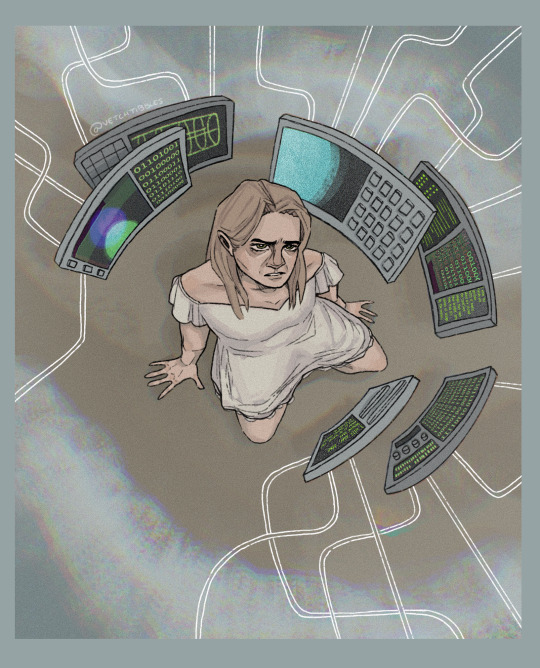
wolf 359 episode 41: memoria
#wolf 359#mostly just because I wanted to draw the ocean#and a couple other random details#art#i have such a specific feel in mind for how I want to design her but I’m so bad at drawing like … industrial tech stuff but ehh it’s fine#for now#wolf 359 podcast
198 notes
·
View notes
Text

let him study botany in peace!!!!!
#happi's art#sherlock and co#sherlock & co#sherlock holmes#hi guys im so normal abotu this podcast#anyways! not sure what exaclty inspired this piece#mostly wanted to draw him with some plants!#also he gets an orchid bc gloria scott <3
266 notes
·
View notes
Text
True knowledge exists in knowing you know nothing || Dr. Ratio & Socrates
Okay, I legitimately laughed out loud writing that title, but listen. LISTEN.
Ratio's inspirations derive from many sources; from referencing Archimedes's brain-blast in the tub, to being doomed to have his head bonked by Newton's apple ad infinitum in his idle animation, to his ultimate line ('esse est percipi' / 'to be is to be perceived') a direct quote from Berkeley on Idealism - it's apparent that his design nods towards scholars across time periods rather than being a direct parallel to a singular academic.
Nevertheless, just for fun, I've been rotating Ratio and ancient greek philosophers around in my head and have had a great time chewing over how parallels Socrates in particular. I am in no way saying that Hoyo even thought about Socrates while they were designing Ratio, but I thought I'd share my thoughts. I think there are some worthwhile parallels to be drawn that touch on all aspects of Ratio's own philosophy regarding ignorance, the value of knowledge, and his deep appreciation of life. So, let's get into it.
Ratio is interested in humanity and curing 'ill minds with knowledge', that 'to turn a blind eye to the folly of others is not an etiquette, but a wicked worldly practice.' Ignorance is a disease - this is a concept that can be viewed through a Socratic lens. Socrates believed that that virtue and knowledge were impossible to separate from one another, and that virtue could be developed through acquiring knowledge and insight. If knowledge is virtue, then ignorance is vice. In Socrates's mind, no one would rationally choose to do something bad. People might choose to do bad things, but this is rooted in their own perception of the world - as in, someone would only choose to do something bad (for the world, or for themselves) because they believed (erroneously) that it was the right or good thing to do. To Socrates, the cure to this was knowledge: 'There are two kinds of disease of the soul, vice and ignorance.' & 'What does most harm in the world is not sinfulness but ignorance'.
To Ratio, 'If ignorance is an ailment, it is the duty of the scholars to weed it out and heal the universe'. He views his own ignorance as 'filth' that must be cleansed through methods such as reading. He also views knowledge as a method for humans to overcome their problems - 'Another day has passed. If your problem still hasn't been solved, is it possible the problem is you?' & 'You look distressed. Is something troubling you? if so, you can figure it out for yourself.' These statements sound harsh, but they also clue us into Ratio's philosophy - that through self-examination and improvement, one can overcome one's ailments.
Socrates was also known for being a trouble-maker, he was abrupt and tactless and did not care for someone's social standing nor decorum. He was also known for using what is now called the Socratic method, asking a series of questions that ultimately seek to show contradictions in the beliefs of those who posed them, and to move systematically towards a hypothesis free from contradiction. Socrates rarely made assertions himself - after all, he had no wisdom of his own. But he could interrogate others in order to expose their own foibles, much to the embarrassment and annoyance of those around him. He was once described as a 'gnat' chewing on the 'lazy horse of Athens', causing it to wake up and spring to life due to his persistent gnawing and prodding. Ratio also employs the Socratic method - 'I'm asking questions' - and also adopts sophist tactics such as playing devil's advocate and taking opposing sides (with both himself as seen a story quest, and with others as we see with his texts urging us to take up a side so he might debate us). Through questioning and interrogation, upsetting what we consider social convention and norms, we can dispel contradictions and thereby come closer to some form of truth.
To add to this - as highlighted in the replies below - Ratio’s skill ‘intellectual midwifery’ is a reference to the Socratic method. The idea being that Socrates helped those around him give birth to the knowledge that was already within them, rather than treating his students minds as empty vessels for him to fill with his own answers. Again this is beautifully echoed in Ratio - he doesn’t want to tell you how to live your life, he wants you to work out for yourself what it is you need, thus empowering oneself through self-examination and questioning.
Socrates did not believe in writing anything down. He believed that face-to-face communication was a far more effective way of communicating knowledge - which means, unfortunately, what we know of Socrates is primarily derived from secondary sources. Much of what we know about him today comes from Plato's dialogues, and Plato was known for liberally exercising artistic license.
Although Ratio is not dead, I find it interesting that his character story is told exclusively through secondary sources. To quote - '…There are no less than eight documentaries detailing his legendary exploits, and over a dozen memoirs about him. However, despite the plethora of commentaries, none of them seems to provide a compelling perspective.' It's as though there are no surviving fragments penned by Ratio's hand and all we have to go on is through the lenses of other people. This challenges us, perhaps, to try to think about our own interpretation of Ratio since secondary sources cannot be taken as a wholly unbiased account - and once again employing the Socratic method and empowering the reader to come to their own interpretation.
While Socrates left no writing behind, he was interested in spreading knowledge. Socrates spent most of his life in Athens, a city that was, during his lifetime (~470-399 BC), a hotpot of scholars, wisemen and philosophers. Athena, the Greek god of wisdom, was named after the city - her symbol the owl that is also appropriately perched on Ratio’s shoulder. Also in Athens at this time where the sophists. The sophists were a class of intellectuals who were known to teach courses in various subjects - but often for a high fee, and generally centred around the idea that persuasion and the use of knowledge as a tool was more important than wisdom or truth itself. There's some debate about whether Socrates could be characterised as a sophist himself, but, crucially, he is characterised as refusing to take payment for his teachings. He was born a plebeian (perhaps you might describe it as a mundane background.) He was known to dress in rags and go barefoot, speaking to and (often antagonising) people from all walks of life, preferring the marketplace as a center of debate than palaces or courtrooms. I can't help but think of the sophists as similar to the genius society (or at least Ratio's depiction of them in contrast to himself), cooped up in ivory towers and gatekeeping knowledge to the most privileged. He doubts if Herta's talent is always helpful to others, he compares Screwllum to a 'monarch'. Then again, the sophists may in fact be a bit of a parallel to the Intelligentsia Guild - from Ratio, 'when someone is willing to listen to knowledge that is being disseminated and circulated, a price is created'.
Socrates (or at least the Platonic depiction of Socrates) was at one time declared the wisest man in Athens by the Oracle of Delphi. Socrates balks at this assertion - how can he possibly be the wisest man in Athens when he in fact knows nothing at all? This was not a claim made of modesty - he truly believed that he had no wisdom, that he was unsure what 'wisdom' itself even was. Ultimately, Socrates concludes that the only way that the Oracle could be correct is that by actually acknowledging that he knows nothing he paradoxically is the wisest man in Athens. All wisdom, therefore, is rooted in wondering, with wondering only possible if one is open to admitting one's own ignorance.
What I love about all of this in relation to Ratio is that Ratio styles himself as a mundanite. The Intelligensia Guild advocates that 'all knowledge must be circulated like currency' and accepts 'all beings… who seek to learn'. Ratio has no time for the satisfied self-styling of intellectualism, he himself states that 'to speak knowledge, we must first make people realise their own folly.' No one is above criticism in this regard, even himself - again, to quote 'Whenever someone agrees with me, I feel like I must be wrong.' Again, I feel as though he would resonate with Socrates here: 'Smart people learn from everything and everyone, average people from their experiences, and stupid people already have all the answers'. With Aventurine, he is quick to mock his appearance as over-the-top and vapid - once again making it clear his distate for vanity and hollow displays of showiness (albeit he may have been acting for Sunday's sake here. Also, no comment about this coming from a man who runs around in a toga, lmao)
Equally, with Aventurine, it is clear that Ratio is willing to learn from him - he apologises when he offends, he abhors his methodology and yet he still relies upon it and trusts in Aventurine's plan, he is drawn to him in some ways precisely because he is so different to himself. Aventurine (at least styles himself) as impulsive to Ratio's slow and steady methodology, Aventurine whose learning has been entirely self-made vs Ratio who has spent his life in classrooms, Ratio who scoffs at Aventurine's favourite games of chance yet adds slot machines to his simulated universe.
And to Socrates, the experience of aporia – in all of its discomfort and disruption – is the very catalyst of wonder, and that wonder was not just the root of wisdom but also the way to live a good and happy life. There is something beautiful in this to me, and this extends to Ratio. Ratio fundamentally cares about life. For all his brashness, his lashing out against 'idiots', his harsh demeanour - he wants people to live good lives, he wants to contribute to the good of humanity - all people, even those he is annoyed by, he cares so profoundly and absolutely about life. The entire reason why he is obsessed with wisdom and learning is not to exalt or elevate himself, not as some kind of ritualistic expression of piety towards a deity, but it is instead an expression of devotion towards life itself. Ratio has a strict work out routine not so that he can show off his body, but because living healthily is living well and working out is a component of that. Even the way he fusses and worries about Aventurine, someone he is pointedly irritated by, reveals how deeply his care runs. So so much of his character is centered on caring for life, even if it is not immediately obvious.
Finally, I'd like to highlight some ways in which Ratio is not like Socrates. First of all, Socrates was repeatedly described as 'ugly' by fellow philosophers Plato and Xenophon - this is contrast to Ratio being repeatedly described as 'handsome'. This is an interesting subversion to me (albeit likely an indulgent one) as in both cases both men attempt to distance their physical appearance from the weight of their words. Ratio wears the bust for many reasons, but way to view it is that he is attempting to stop his appearance from bearing any influence in the subject of debate.
Socrates was also said to be blessed by a divine touch, and as we know, this is something that agonises Ratio as Nous has not yet turned THEIR gaze towards him.
Lastly, Ratio has - thankfully - not yet been ordered by the state to drink hemlock for all his trouble-making and blustering. Though perhaps he may someday be put on trial by the IPC if the theories that he is working alongside Aventurine to undermine the corporation are true - we will just have to wait and see.
Thanks for reading my little ramble. I'd be super interested in anyone's thoughts if they'd like to share, but regardless, I'll leave off on some of my favourite wee quotes from the Rat man:
'Even a life marked by failure is a life worth living - it is only in moments of solitude and despair, when help is absent, that fools grasp how to pick themselves up.'
'Do stay alive. I wish you the best of luck.'
#dr ratio#ratio#aventurine#hsr#honkai star rail#my witterings#i love the rat man so much idk#much of the information i describe about Socrates comes from the podcast History of Philosophy without the Gaps#which I highly recommend if this is your kind of thing lol#but mostly I just wanted to have fun spinning my hyperfixation around lol#Also I make a few declarative statements throughout this but know that I do not claim to be a scholar of greek philosophy lol#please check the verasity for yourselves before relying on what I have to say#for I know nothing u see u see? :P#also I just wanna add in that I do NOT think Ratio is a perfect human being#ratio can be hypocritical and cruel and ignorant just like the rest of us#but I adore that too as afterall he is also an expression of humanity#with all its earthy faults
156 notes
·
View notes